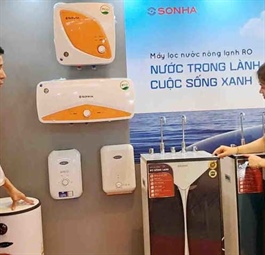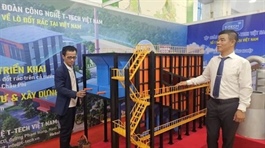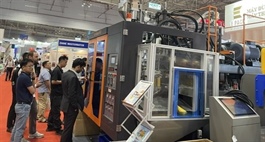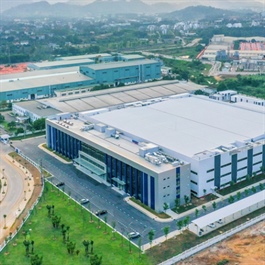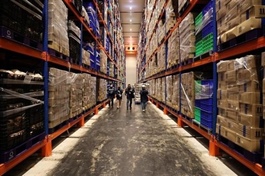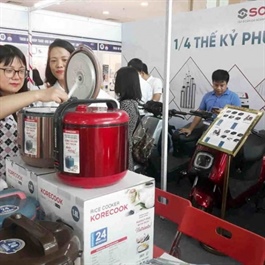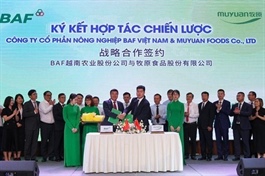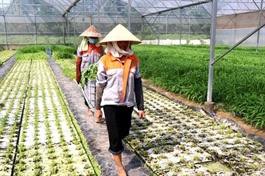VN needs to engage more with the global energy chain
VN needs to engage more with the global energy chain
Việt Nam needs to take more drastic actions to accelerate energy transition and engage deeper into the global energy chain, a conference held by Diễn Đàn Doanh Nghiệp (Business Forum) magazine heard on Thursday.
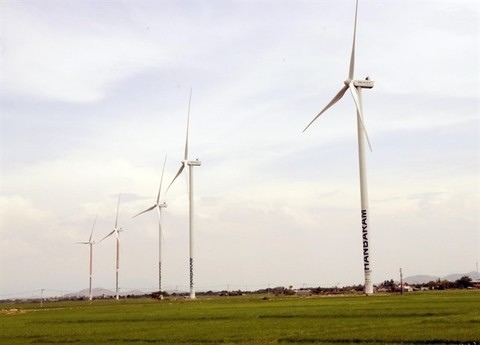
A wind farm in Ninh Thuận Province. With strong demand for renewable energy, opportunity is becoming clearer for Vietnamese firms to participate more deeply in the clean energy supply chain. — VNA/VNS Photo Công Thử |
Việt Nam is facing an urgent need for energy transition, with clear ambitions and goals for sustainable development to shift from an energy structure that relies mainly on coal to renewable energy, according to Abhinav Goyal, director of Capital Projects and Infrastructure at PwC Việt Nam.
Coal-fired thermal power capacity is expected peak in 2030, then gradually decreases to zero in the 2030-50 period. Renewable energy is expected to account for 31 per cent and 62 per cent of the total energy supply by 2030 and 2050, respectively.
The energy supply chain is changing. The manufacturing of solar panels and turbines in Việt Nam is growing strongly but is largely dependent on imports, adding that the import rate of renewable energy still amounts to up to 90 per cent of components.
With strong demand for renewable energy, opportunities are becoming clearer for Vietnamese firms on how to participate more deeply in the supply chain, he said, adding that strong policies are needed to encourage their participation.
He pointed out that several countries, such as Indonesia, have set requirements for local procurement rates for sectors like solar power, wind power and geothermal energy, or have raised policies to encourage local cooperation in renewable energy projects.
It is also necessary to narrow the capacity gap, through promoting technology and knowledge transfer from foreign investors to domestic enterprises, as well as providing incentives for local enterprises to invest in enhancing research and development capacity, he said.
Deputy director of Vietnam Electricity (EVN) Võ Quang Lâm, said that energy transition is taking place globally with three major trends, including decentralisation, decarbonisation and digitalisation and technology application to improve electricity system efficiency and service quality.
Although energy transition is a challenging process, Việt Nam cannot be let out of the global shift in the energy supply chain, Nguyễn Sĩ Đăng from the Ministry of Science and Technology said.
There are significant opportunities arising from the energy transition which can even turn Việt Nam into a hub for renewable energy of ASEAN, Đăng said. One of the requirements for Việt Nam to do this is to ensure technological autonomy and energy autonomy.
Any energy transition must rely on the advantages that Việt Nam already has, Đăng said, adding that power sources in which Việt Nam has mastered technology, such as hydropower, need to be maintained.
“Transition should not be too rapid, but needs an appropriate roadmap,” he said.
Đăng noted that energy transition is also creating significant opportunities for Vietnamese firms to participate in the global energy chain which includes four phases: generation, transmission, distribution and consumption. Private investors should focus on generation and distribution rather than transmission and consumption, he said.
He expected enterprises to partner up so that Việt Nam can achieve energy autonomy.
“To achieve net zero by 2050, Việt Nam needs to understand the global energy supply chain and address related challenges,” Nguyễn Anh Tuấn, general director of B.Grim Power Việt Nam said.
Việt Nam has caught up very quickly, taking the first steps in 2016 in establishing renewable energy projects. However, for sustainable development, more drastic solutions are needed, Tuấn said.
The country needs to encourage private investment in clean energy, he said. Although Việt Nam is focusing on calling for international capital, the policies remain inadequate and lack consistency.
“The mechanism needs to be clearer to avoid disruptions and facilitate the processing of capital mobilisation for renewable enery projects.”
Improving human resources quality and infrastructure are also important, he said.
He also stressed the importance of promoting international cooperation and technology together with a more flexible electricity pricing mechanism, adding that a reasonable mechanism will not only promote investments in renewable energy, but also encourage energy saving.
According to Vũ Chi Mai, CASE project direct in Việt Nam under the GIZ Energy Support Programme, the country has a large potential to participate in the global energy chain, specifically in wind and solar with advantages in production of cables and electronic equipment.
“The energy transition brings significant opportunites but also challenges, from supply chain management, human resource training to ensuring rare raw materials. This is not a matter for Việt Nam but also a global concern. Preparations must be made to seize future opportunities,” Mai said.
Nguyễn Mạnh Hùng from RMIT University, said that there exist threats to the stability of the clean energy supply chain today, including technology maturity, policy commitments, investment and funding gaps, as well as stringent environmental requirements.
Việt Nam has introduced strong policies for energy transition but the country needs appropriate roadmap in line with demand for energy for a sustainable transition, Hùng stressed.
Large potential of green hydrogen
There are significant opportunities for enterprises in hydrogen production, Lê Ngọc Minh Anh, President of Việt Nam ASEAN Hydrogen Club said.
Under Việt Nam’s hydrogen development strategy by 2030 announced in February, Việt Nam aims to produce 100,000-500,000 tonnes of hydrogen per year from the renewable energies and 10-20 million tonnes by 2050.
According to International Energy Agency, low-emission hydrogen production represented less than one per cent of total hydrogen production of 97 million tonnes in 2023. Low-emission hydrogen is produced through water electrolysis using electricity derived from renewable energy sources.
Specially, he noted an opportunity to supply hydrogen energy for the North-South high-speed railway and urban metro.







